
You've noticed that your breasts have grown, or that your first pubic hair has appeared. You saw traces of vaginal discharge on your underwear or even got your first period. Every day, the image in the mirror seems to change a little more. Acne, excess sebum, the overwhelming feeling that you want to cry without knowing why, WHAT IS GOING ON WITH YOUR BODY?
It's okay, we've all been through it: you're going through puberty! Your body is preparing you to become a woman. So it develops and matures so that one day, if you will, you can create life. This preparation process is called puberty, and that's what we're going to talk about in the next few minutes.
What does it mean and at what age does puberty start in girls?
So what is puberty and why does it feel like everything in your body changes when it hits?
Puberty is the name of that stage in life when your body begins to develop and change. It is a process of sexual maturation, often overwhelming in the abundance of changes it triggers, that transforms a girl's body into a woman's body ready to give birth.

In general, puberty in girls starts from 8-14 years and can span several years. Of course, every girl's body is unique and it's normal to develop at your own pace.
Growth and development of the body at puberty
The first thing we want you to know is how important it is to keep a positive attitude. Yes, change can be overwhelming. But puberty is also a special stage in your life. Your body takes on a more feminine shape, you mature, you find your own charm. Not that bad, right?
Equally important is to realize that the changes are not just physical. When puberty begins in girls, changes take place both physically, mentally and emotionally. You can feel the experiences more intensely, emotions are a rollercoaster, and thoughts a source of ideas and new perspectives.
Navigating this new world of adulthood isn't easy, so we've outlined for you the girls' guide to puberty, a short map of the physical changes you may notice. When you're prepared, not only do they stop overwhelming you, but you manage to get along and do great!
Breast development in girls - Until what age do breasts grow?
Breast development is one of the first signs that puberty is starting, at ages 8-13. It is a normal and natural process and breasts can continue to grow and develop up to 17-18 years. 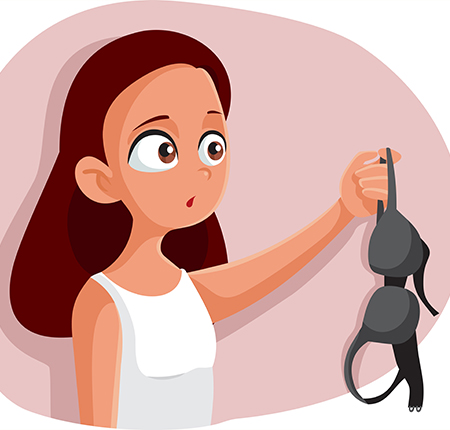
It is also good to know what symptoms you have when your breasts grow, because their development can be accompanied by:
Tenderness or pain: These usually go away on their own, but a comfortable bra or soothing gels can help protect the growth and minimize pain.
Mild itchy skin: As your breasts grow, the skin tissues stretch and this may cause you to feel mild itchiness which is normal and will go away on its own.
Stretch marks: Sudden growth can thin the skin, leaving pink, red or purple stretch marks; they are normal at puberty and will become less visible with time, losing their color.
Uneven breasts: the two breasts may have a different rate of growth; it is normal for most women and most often become equal over time.
Changing nipples: And changing color to pink or brown or the appearance of occasional hairs are perfectly normal for nipples during breast development.
Body Hair - Appearance of pubic & axillary hair
You will begin to notice the thickening of the hairs and their appearance in new areas of the body. On average, girls notice the appearance of axillary (underarm) and inguinal (pubic) hair around the age of 12.
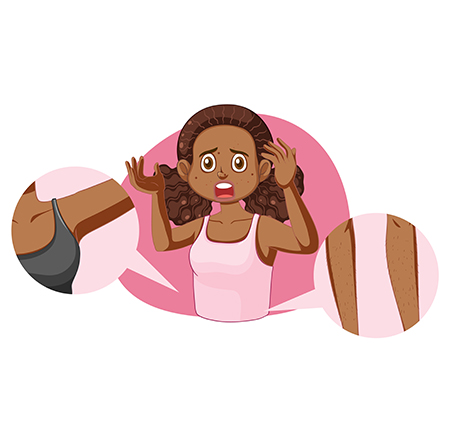
At first thin, the hair thickens, becomes longer and darker in the axillary and pubic area, then by the end of puberty it can reach above the thighs.
Changes can be overwhelming, so advance discussions and preparatory explanations from parents are important. These discussions should also provide information on what removal methods are available and how to use them safely if desired, to avoid accidents and irritation due to curiosity and lack of information.
Height Growth - At what age do girls grow?
From the onset of puberty at ages 8-13, girls begin to grow in height and weight, a process that can continue for several years even after the onset of menstruation. If you want to know roughly how old girls grow, they usually peak around 14-15 years old.
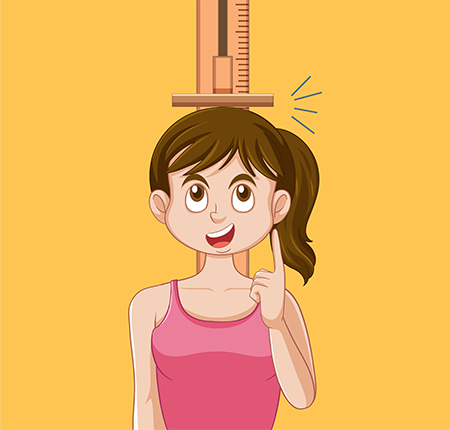
You may notice that the whole general shape of your body changes, even your hands and feet seem to grow, and you seem to become a little more clumsy. It's nothing to worry about, just your body adjusting to its new dimensions.
First period
You will notice that the first period, expected or unexpected, is a special and memorable moment. This tells you that your puberty is progressing, your ovaries are releasing their first egg, and you are starting to bleed through your vagina.
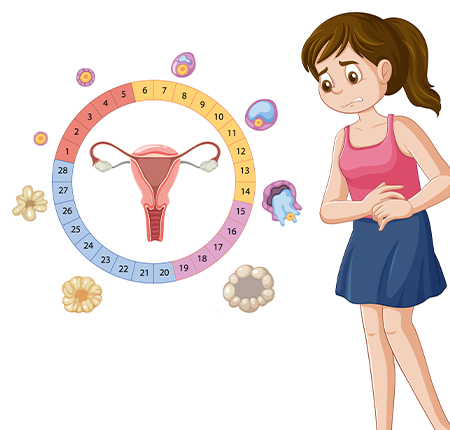
Bleeding can have different colors and flows, from heavy dark red bleeding to red-brown discharge. They can be accompanied by abdominal cramps, dizziness, headaches and an amalgam of emotions.
You are still starting to use menstrual products and it is important to choose the ones that support you as you need. Irritations and allergies will make your first period and symptoms even more overwhelming, which is why Enroush products are 100% hypoallergenic organic cotton, with care for your skin.
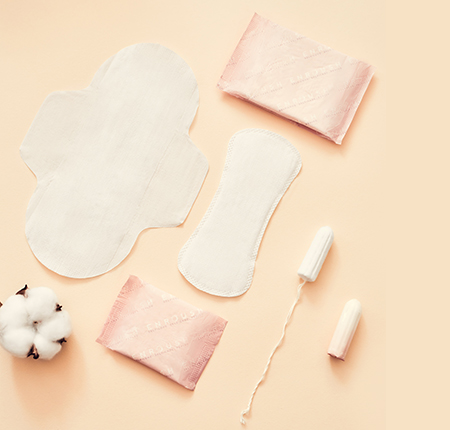
As I said before, every body has its own rhythm. But most girls get their first period 2-3 years after their breasts start growing. In the first 3 years, periods may be irregular lasting up to 7 days, and this is perfectly normal. It is considered abnormal if it lasts longer or is absent for 3 months, in which case a doctor's consultation is recommended.
Vaginal discharge
From 6-12 months before your first period, but also after, you will also notice small or medium amounts of slippery fluids on your underwear. You can avoid staining your underwear and that feeling of not feeling fresh by using organic daily absorbents . Breathable and thin, you almost forget you're wearing them, but they wick away moisture and leave your skin dry.
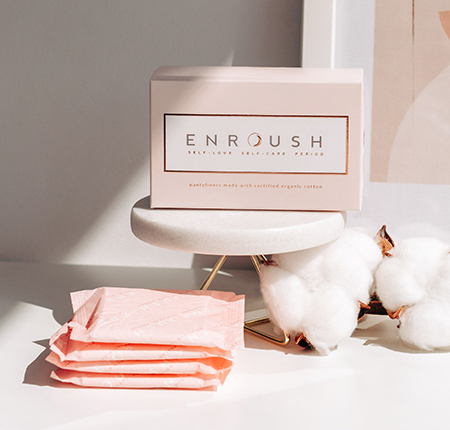
Vaginal discharge is a response to the increased level of estrogen in the body and as long as it is clear or white in color, it is perfectly normal. They become abnormal when you notice drastic changes in texture or color.
Hips & pelvis growth
The whole image of the girl in the mirror changes at puberty, not just height and certain body parts. Part of female development is also the definition of a more curved contour, rounder shapes. This definition is given by the growth of the hips and pelvis.
Even now, weight gain, rounding of the breasts and thinning of the waist can be observed. It is not necessary, nor recommended, to start a diet to lose weight at this stage of puberty, as long as you are not dealing with obesity.
Acne, sweat & excess sebum
Acne appears, the skin produces more sweat and sebum - these are all signs of puberty and trigger anxiety for many teenage girls, despite the fact that they are normal. Although hormonal changes cause them, managing these changes is your responsibility.
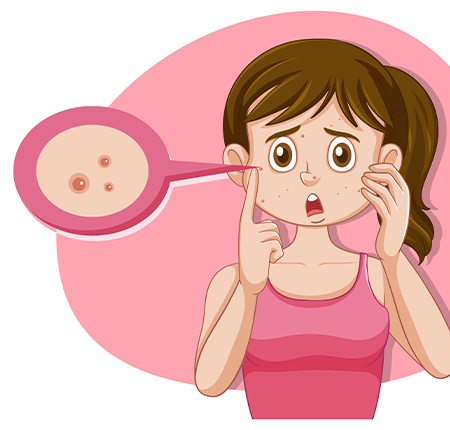
The most important - and at the same time basic - thing you can do to get over these unpleasant effects more quickly and easily, is to maintain proper hygiene. Even more so in areas where there are many bacteria:
Hand washing: You often run your hands through your hair or face, and this can increase oily hair and acne; make sure you wash your hands frequently so they are clean before contact with your skin.
Natural antiperspirants: Excessive sweating is unpleasant, but some chemicals and perfumes can make it worse. Showering as often as needed and using the right antiperspirants will be the best solution.
Protection of the intimate area: Your vulva is prone to the accumulation of bacteria, and using conventional intimate hygiene products can throw your pH out of balance, issuing an open invitation for fungi or candida. Use Enroush intimate gel that contains 95% natural ingredients and makes a mission to strengthen the barrier against infections.
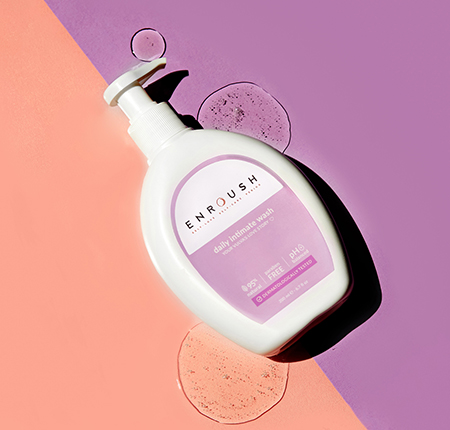
Precocious puberty in girls
There are cases when the signs of puberty appear early, before the age of 8. It is called precocious puberty, to which girls are 8-10 times more prone than boys and which manifests itself as follows:
Breasts develop prematurely: without other signs of precocious puberty, it can start at a very young age. In this case, a pediatric endocrinologist is consulted.
Pubic hair appears in children: the adrenal glands produce hormones early and hair appears in the axillary or pubic area. It is not a sign of concern for parents, but the specialist consultation of the adrenal glands is recommended for abnormal functioning.
Acne, sweating, sudden growth in height and first menstruation appear.
Delayed puberty in girls
Because every body is unique and develops at its own pace, puberty will start differently for every girl, at the right time for her body.
But if she reaches the age of 12-13 and the breasts have not yet started to develop, or the first menstruation does not appear until the age of 15-16, we can talk about delayed puberty and it is time for a visit to the doctor. When the cause is treated, puberty usually begins and the body develops normally.
Behavioral, emotional & social changes
Puberty is a chapter that creates a tumult of changes not only on the outside, but also on the inside! Parental and family support, patience and understanding are crucial at this stage.
We're now talking about what new skills girls are developing, what they're dealing with emotionally at puberty, and how their social behavior is changing.
Development of cognitive skills
With rapid cognitive development at puberty, girls' brains also undergo biological changes in connections and structure. Attention, memory, speed of understanding - all these aspects improve in puberty, as well as abstract thinking and the ability to create new ideas.
Cognitive development can be encouraged, and this is even recommended, by including the girl in discussions and debates on various topics, supporting her to express her thoughts and ideas, and encouraging independent thinking.
Emotional changes at puberty
Emotions become stronger, more intense, interests change, mood swings appear and everything is normal! Girls may have increased emotional sensitivity, new experiences that they haven't had before, and they may also feel sad, angry or nervous without knowing why.
Parents need to be vigilant, and if the severity, impact and duration of these conditions become a concern, discussion and specialist help are essential to prevent depression and maintain psycho-emotional health.
Social relationships at puberty
As a parent, you may notice that your little girl is developing a desire for privacy and independence from her family. Nervousness and frustration arise when these boundaries are violated. She may also fall in love, wish to be accepted, validated and belong to certain social groups, spend more time with friends than at home and changes in the social hierarchy may occur.
Relationships with parents and family change, new types of relationships begin. It is normal that during puberty, the evolution is not only physical and emotional, but also social. You will have to be patient and be with her to be able to help her understand and go through all these transformations.
When should I go to the doctor?
By adulthood when puberty ends, the tumult of change seems overwhelming and alarming. Most of the time, the changes are normal and will go away on their own. However, in some cases, the abnormality exceeds the spectrum of natural changes, and then it is time for a visit to the pediatrician. A few things to keep in mind:
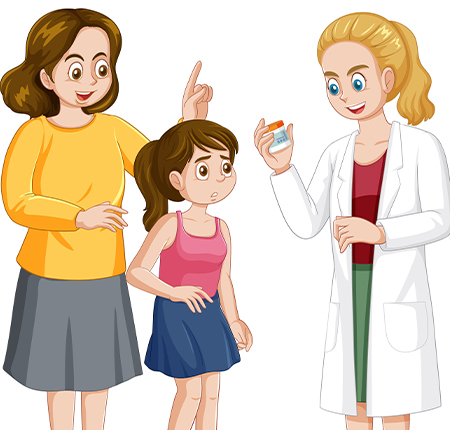
The first visit to the gynecologist, according to the standard recommendation, is ideal at the age of 13-15 years. This visit can consist of a simple discussion, where the doctor can provide answers, explanations or useful information.
If worrying signs of puberty appear, too early or too late, a visit to the pediatrician is necessary for further investigations.
Likewise in case of irregular cycle, if 3 months pass from the first menstruation without the next one appearing.
Useful tips for parents of girls
As difficult as puberty is for children, it can be challenging for parents of girls. Here are some pointers that will be useful both to help your little girl cope with the changes as easily as possible, and to help yourself on this journey:
Taking puberty changes seriously: Even if they seem insignificant to you, listen to them without prejudice or shame, and take them seriously if they worry your child. This way you encourage her to talk about them and you can tell when they are normal and when they are not.
Open Communication: Puberty brings with it hundreds of questions. Be sure to respond, whether it's information, trivia, or how-to's. The more prepared she is for all the changes and her first period, the less traumatic it will be.
Sensitivity and responsibility: Confusion and insecurity are normal in puberty. Girls need both their parents' sensitivity to guide them through new emotions, and their calm and responsible voice to impose much-needed safety boundaries.
Tolerance and respect: Intimacy is necessary, as is tolerance for her new interests. Try to respect her desire to spend time with friends, as well as the long hours dedicated to personal care: it's a new and exciting territory for her to explore.
Involvement : Stay close and present in her life. Follow the evolution of the changes you are going through, and if there are any worrying signs, be they physical or emotional, discuss them with the specialist doctor.






















